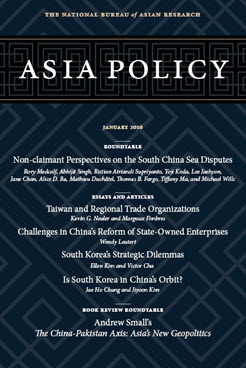South Korea and the South China Sea
A Domestic and International Balancing Act
This essay is part of the roundtable “Non-claimant Perspectives on the South China Sea Disputes.”
South Korea has long been unclear on its stance regarding the territorial disputes in the South China Sea. For many years, the closest thing the government had to an official position was the consistent but vague statements of successive spokespeople from the Ministry of Foreign Affairs. These statements essentially noted that the Republic of Korea (ROK) supported freedom of navigation in the South China Sea and hoped the parties involved would resolve the disputes in a peaceful manner through dialogue.
In 2015, however, there was a slight but crucial change in that position. There had long been rumors that South Korea was under pressure from the United States to clarify its position on the South China Sea. Then, in November, Defense Minister Han Min-goo delivered remarks at the ASEAN Defense Ministers’ Meeting-Plus (ADMM-Plus) stating that freedom of navigation and overflight must be guaranteed and that the disputes should be resolved in a peaceful manner. [1] Later that month, President Park Geun-hye went a step further at the East Asia Summit in Malaysia when she stated that concerned parties should observe the Declaration on the Conduct of Parties in the South China Sea and that disputes should be resolved according to international law. She went on to assert that concerned countries must respect the promise of demilitarizing the South China Sea, which was widely interpreted as supporting the U.S. position on the disputes. At the 2015 East Asia Summit, Park argued that “Korea has consistently stressed that the dispute must be peacefully resolved according to international agreements and code of conduct” and “China must guarantee the right of free navigation and flight.” [2]
Despite these recent clarifications by the president and defense minister, South Korea’s position on the disputes in the South China Sea has been quite vague and ambivalent. While South Korea does not claim any territories in the South China Sea and has no direct military or strategic interests there, to fully understand the country’s position, it is important to understand what stakes the ROK does have in the resolution of the current disputes. This essay examines these issues and draws implications for South Korea’s relations with both the United States and China.
South Korea’s Economic and Diplomatic Interests in the South China Sea
Though lacking direct strategic and military interests in the region, South Korea nevertheless has huge economic interests in the South China Sea. As the world’s sixth-largest trading nation by volume, it is highly dependent on the free flow of goods. In 2014, more than 1.1 billion tons of its trade passed through the South China Sea. South Korea is also highly dependent on energy resources from overseas. Approximately 86% of its oil consumption is supplied by imports from the Middle East, almost all of which must transit the South China Sea. [3] In sum, any undesirable events in the South China Sea or a consequential blockade of its sea lanes would be devastating to the South Korean economy.
The ROK’s diplomatic interests in the region are just as important as trade. First, in recent years, South Korea has developed a close partnership with the Association of Southeast Asia Nations (ASEAN) countries, and two of the most vocal South China Sea claimants—the Philippines and Vietnam—are ASEAN members. South Korea fears that when it discusses security cooperation with the ASEAN countries, its position on the disputes may be on the agenda, which is likely to put it in an awkward position. Additionally, South Korea frequently calls on ASEAN countries for support on Korean Peninsula issues such as North Korean denuclearization. If some ASEAN countries were to ask it to support ASEAN’s position on the South China Sea disputes in return for their supporting South Korea on the Korean Peninsula, then Seoul would face a dilemma…
Endnotes
[1] “Freedom of Navigation Should Be Guaranteed in Disputed South China Sea: S. Korean Defense Minister,” Yonhap News Agency, November 4, 2015, http://english.yonhapnews.co.kr/news/2015/11/04/0200000000AEN20151104008751315.html.
[2] “Park Appeals to Beijing on South China Sea,” Korea Joongang Daily, November 24, 2015, http://koreajoongangdaily.joins.com/news/article/Article.aspx?aid=3011908.
[3] “Namjung-gughae ginjang gojo…Suchul-ib hanglo maghilkka choggag” [Rising Tension in South China Sea…Maritime Trade Route in Danger], Yonhap News Agency, October 28, 2015, http://www.yonhapnews.co.kr/bulletin/2015/10/28/0200000000AKR20151028212600003.HTML; and Ministry of Foreign Affairs (ROK) website, http://www.mofa.go.kr/ENG/policy/energy/overview/energy/index.jsp?menu=m_20_130_10&tabmenu=t_3.
Lee Jaehyon is a Senior Research Fellow in the ASEAN and Oceania Studies Program in the Center for Regional Studies and the Director of External Relations at the Asan Institute for Policy Studies.
About Asia Policy
Asia Policy is a peer-reviewed scholarly journal presenting policy-relevant academic research on the Asia-Pacific that draws clear and concise conclusions useful to today’s policymakers. Asia Policy is published quarterly in January, April, July, and October and accepts submissions on a rolling basis. Learn more


